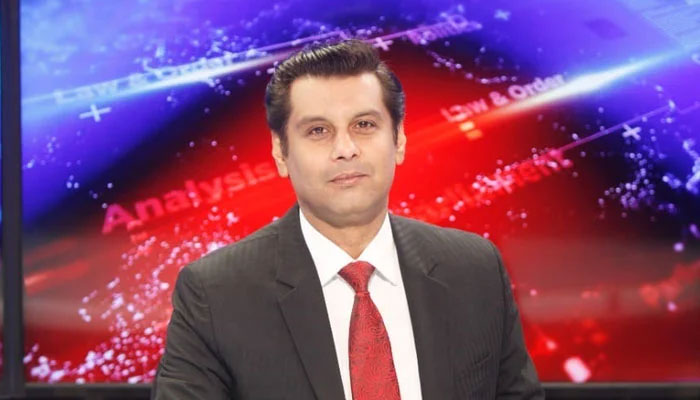Arshad Sharif murder: SC gives govt last chance to complete probe
Attorney general told the court that mutual legal assistance was not yet made with the Kenyan authorities
ISLAMABAD: The Supreme Court on Tuesday expressed dissatisfaction over the progress so far made by the Special Joint Investigation Team (SJIT) in the murder case of journalist Arshad Sharif, providing the last opportunity to the federal government to complete the investigation and come up with a tangible result. A five-member larger bench of the apex court, headed by Chief Justice of Pakistan (CJP) Justice Umar Ata Bandial and comprising Justice Ijazul Ahsan, Justice Muhammad Ali Mazhar, Justice Jamal Khan Mandokhail and Justice Mazahar Ali Akbar Naqvi, heard the suo motu case of journalist Arshad Sharif, who was killed in Kenya on October 23, 2022.
Attorney General Mansoor Awan and Additional Attorney General Aamir Rehman appeared before the court. The attorney general told the court that mutual legal assistance was not yet made with the Kenyan authorities, while red warrants for Khurram and Waqar also could not be issued.
Justice Bandial observed that the court does not need reports lacking progress in the instance case, adding that it wants an independent and transparent investigation into the murder of journalist Arshad Sharif. He hinted at adopting alternative options if no progress was made in the matter in hand.
During the hearing, the widow of Arshad Sharif told the court that she had brought an application written to the United Nations.
The court, however, asked her to keep it with her, saying that the last chance was being given to the government to come up with progress in the matter.
Additional Attorney General Aamir Rehman told the court that so far they had submitted four reports pertaining to the investigation.
Justice Mazahar Naqvi, however, observed that no progress had been made in the murder investigation so far, except visits of the investigating team.
The attorney general submitted that the United Arab Emirates had responded after five months, asking for sending a stamped letter translated into Arabic.
The CJP observed that English is acceptable across the globe now. The attorney general further submitted that the UAE government sent a letter asking questions in connection with mutual legal assistance on April 11 and the government responded on April 27.
He informed the court that the Kenyan government had also not yet refused to extend cooperation in the investigation of the journalist’s killing.
Justice Naqvi asked the AG if the SJIT had declared Khurram and Waqar accused in the progress report, and whether red warrants for them had been issued through Interpol. He said they have strong reservations over the seriousness of the government, as red warrants for the accused had not yet been issued.
The AG replied that the SJIT had issued a request to the Federal Investigation Agency in this regard. He assured the court that he would personally look into hiring a law firm for mutual legal assistance.
The court adjourned the hearing until June 13 and directed the SJIT to submit a progress report then.
-
 Jessica Alba, Cash Warren Finalize Divorce After 16 Years Of Marriage
Jessica Alba, Cash Warren Finalize Divorce After 16 Years Of Marriage -
 China’s AI Boom Takes Center Stage At Spring Festival One Year After DeepSeek Stirred The Industry
China’s AI Boom Takes Center Stage At Spring Festival One Year After DeepSeek Stirred The Industry -
 James Van Der Beek Called His Sixth Child Jeremiah 'healing For Us' Before His Death
James Van Der Beek Called His Sixth Child Jeremiah 'healing For Us' Before His Death -
 Elon Musk Vs Reid Hoffman: Epstein Files Fuel Public Spat Between Tech Billionaires
Elon Musk Vs Reid Hoffman: Epstein Files Fuel Public Spat Between Tech Billionaires -
 Gordon Ramsay Denies Victoria Beckham Got Handsy With Brooklyn At His Wedding
Gordon Ramsay Denies Victoria Beckham Got Handsy With Brooklyn At His Wedding -
 Gordon Ramsay Makes Unexpected Plea To Brooklyn As He Addresses Beckham Family Feud
Gordon Ramsay Makes Unexpected Plea To Brooklyn As He Addresses Beckham Family Feud -
 Prince Harry Warns Meghan Markle To 'step Back'
Prince Harry Warns Meghan Markle To 'step Back' -
 Selena Gomez Explains Why She Thought Lupus Was 'life-or-death'
Selena Gomez Explains Why She Thought Lupus Was 'life-or-death' -
 New Zealand Flood Crisis: State Of Emergency Declared As North Island Braces For More Storms
New Zealand Flood Crisis: State Of Emergency Declared As North Island Braces For More Storms -
 Nancy Guthrie Case: Mystery Deepens As Unknown DNA Found At Property
Nancy Guthrie Case: Mystery Deepens As Unknown DNA Found At Property -
 James Van Der Beek's Brother Breaks Silence On Actor's Tragic Death
James Van Der Beek's Brother Breaks Silence On Actor's Tragic Death -
 Megan Thee Stallion On New Romance With Klay Thompson: 'I'm Comfy'
Megan Thee Stallion On New Romance With Klay Thompson: 'I'm Comfy' -
 Nicole Kidman Celebrates Galentine’s Day Months After Keith Urban Split
Nicole Kidman Celebrates Galentine’s Day Months After Keith Urban Split -
 Justin Bieber Unveils Hailey Bieber As First Face Of SKYLRK In Intimate Campaign Debut
Justin Bieber Unveils Hailey Bieber As First Face Of SKYLRK In Intimate Campaign Debut -
 Caitlin O’Connor Says Fiance Joe Manganiello Has Changed Valentine’s Day For Her
Caitlin O’Connor Says Fiance Joe Manganiello Has Changed Valentine’s Day For Her -
 Rachel Zoe Sends Out Message For Womne With Her Post-divorce Diamond Ring
Rachel Zoe Sends Out Message For Womne With Her Post-divorce Diamond Ring




